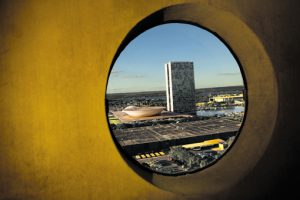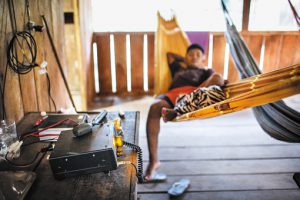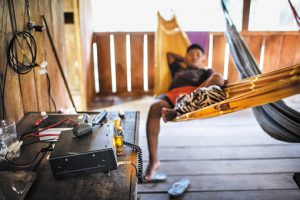
Brazil’s Global Ambitions
When President Dilma Rousseff first took office in 2010, Brazil’s future looked exceptionally bright. For nearly a decade, the country had benefited from Asia’s enormous appetite for its commodities. This allowed Brazil to reduce poverty and expand the middle class while at the same time sustaining a remarkable growth rate, becoming the seventh largest economy … Read more

Dispatches: Amazonas, Brazil
A lot of people would like to know how Ivan Tenharim died. On the afternoon of December 2, 2013, a relative found the chief of the Tenharim people in Brazil’s Amazonas state lying unconscious near his undamaged motorcycle on a long, uninhabited stretch of the Trans-Amazonian Highway. His neck was broken, and blood was trickling … Read more

Business Innovator: Amazon Beer Cervejaria
The high wall that separates Amazon Beer’s brewery and bottling plant from the teeming jungle hardly holds back the snakes, monkeys and giant hairy spiders. But invasive animals are only one of the challenges faced by Arlindo Guimarães and his son Caio in developing the only craft brewery in the Amazon. “A lot of people … Read more
Monday Memo: Venezuela Protests – Haiti Elections – Caribbean Energy – AT&T – Brazil Olympics
This week’s likely top stories: Venezuelan opposition leaders halt protests in Caracas; Haiti swears in its nine-member Provisional Electoral Council; the U.S. hosts the first-ever Caribbean Energy Security Summit; AT&T acquires Nextel Mexico; Rio’s environment secretary announces that Guanabara Bay will not be clean in time for the 2016 Olympic Games. Opposition Curbs Protests in … Read more
Chasing Unicorns in Brazil
On the border of Brazil and Paraguay, David Rodrigues Krug is chasing a unicorn. That’s how he describes his work at the massive Itaipu Dam on the Paraná River, which forms a natural border between the South American neighbors. In three decades of operation, the five-mile-wide, 65-story dam has come close to generating 100 billion … Read more
I’m No Scientist, But It’s Sure Hot in Rio
In last night’s State of the Union address, U.S. President Barack Obama spoke about climate change (among many other things) and challengd climate change skeptics who “try to dodge the evidence by saying they’re not scientists.” “Well, I’m not a scientist, either,” Obama said. “But you know what? I know a lot of really good … Read more

Dispatches: Amazonas, Brazil
Glenn Cheney on the life-and-death struggle of Indigenous Tenharim to preserve their land and their resources. (slideshow available)
Monday Memo: Haiti – Nicaragua Canal – Oil – Petrobras Scandal – Guantánamo
This week’s likely top stories: Florence Duperval Guillaume is named Haiti’s interim prime minister; farmers set up blockades to protest the Nicaraguan canal; Saudis tell non-OPEC producers to reduce output; Brazilian President Dilma Rousseff says she will not replace Petrobras CEO; Four more prisoners are released from Guantánamo. Interim Haitian Prime Minister Named: Haitian Health … Read more
Brazilian Truth Commission Publishes Damning Report
After more than two years of research, Brazil’s Comissão Nacional de Verdade (National Truth Comission—CNV) delivered its official report yesterday on human rights violations committed in Brazil between 1946 and 1988—with a focus on the country’s 1964 to 1985 military dictatorship. According to the report, “Under the military dictatorship, repression and the elimination of political … Read more
Monday Memo: Brazil Petrobras — Haiti Protests — LatAm Currencies — Guantánamo Prisoners —Mexico Missing Students
This week’s likely top stories: Brazilian prosecutor plans to indict at least 11 in the Petrobras scandal; Haitian protestors in Port-au-Prince demand long-overdue elections; Latin American currencies drop as U.S. job growth surges in November; U.S. releases six Guantánamo prisoners to Uruguay; Meixcan government identifies the remains of one of 43 missing students. Brazilian Prosecutor … Read more
Perícia sobre morte de Goulart é inconclusiva
Os resultados de uma perícia com o ex-presidente do Brasil, João Goulart, deposto em um golpe militar em 31 de março de 1964, foram divulgados no dia 1 de dezembro pela Comissão Nacional da Verdade. A comissão é uma iniciativa do governo brasileiro que tem como objetivo investigar possíveis violações de direitos humanos ocorridas entre … Read more
Monday Memo: Colombia Peace Talks — U.S. Refugee Status — Petrobras Arrests — Cuba Tourism — Pemex Investments
This week’s likely top stories: Colombia’s peace talks suspended over kidnapping; U.S. will grant refugee status to select minors from Central America; Brazilian police arrest 27 in Petrobras corruption scandal; Cruise ship tourism is booming in Cuba; Pemex invests millions in hydrocarbon production and exploration. Kidnapping Halts Colombian Peace Talks: Colombian President Juan Manuel Santos … Read more
São Paulo asks for $1.4 billion for Infrastructure Projects to Alleviate Drought Crisis
São Paulo Governor Gerardo Alckmin presented a $1.4 billion plan for eight infrastructure projects to mitigate the state’s drought crisis in a meeting with President Dilma Rousseff in Brasília yesterday. The meeting took place at the Palácio do Planalto between Rousseff, Alckmin, Environment Minister Izabella Teixeira and Planning Minister Miriam Belchior, with Belchior voicing concern over … Read more
Is Dilma Rousseff the Answer for Brazilian Women?
Brazil’s October 26 election was undoubtedly contentious. As incumbent Dilma Rousseff edged out centrist opposition leader Aeció Neves in a runoff with only 51.6 percent of the vote, it was one of the closest elections in Brazilian history. Ultimately, the Brazilian people opted for another four years with the Partido dos Trabalhadores (Workers’ Party—PT). So … Read more
Monday Memo: Brazil Military Drills — Mexico High-Speed Rail — Colombia FARC Trials — AT&T Expands — Mexico Protests
This week’s likely top stories: Brazil’s military launches training operation in Amazon; Mexico cancels high-speed rail contract to Chinese-led consortium; Indigenous court in Colombia convicts seven FARC members; AT&T purchases Iusacell; Mexico erupts in protests over reported discovery of remains of the 43 missing students. Brazilian Military Trains in the Amazon: According to the chief … Read more



